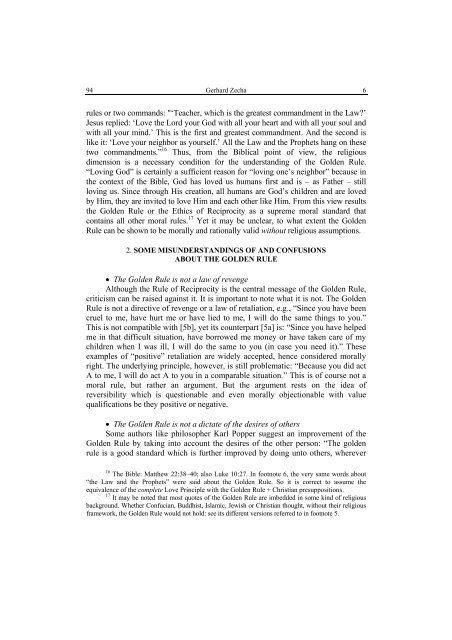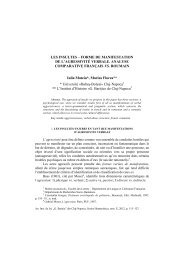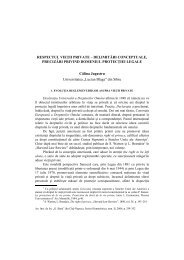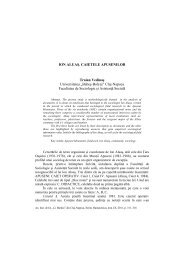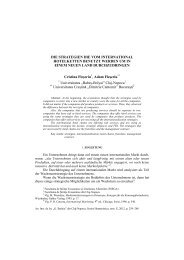THE GOLDEN RULE IN APPLIED ETHICS - Series HUMANISTICA
THE GOLDEN RULE IN APPLIED ETHICS - Series HUMANISTICA
THE GOLDEN RULE IN APPLIED ETHICS - Series HUMANISTICA
Create successful ePaper yourself
Turn your PDF publications into a flip-book with our unique Google optimized e-Paper software.
94 Gerhard Zecha 6<br />
rules or two commands: "‘Teacher, which is the greatest commandment in the Law?’<br />
Jesus replied: ‘Love the Lord your God with all your heart and with all your soul and<br />
with all your mind.’ This is the first and greatest commandment. And the second is<br />
like it: ‘Love your neighbor as yourself.’ All the Law and the Prophets hang on these<br />
two commandments.” 16 Thus, from the Biblical point of view, the religious<br />
dimension is a necessary condition for the understanding of the Golden Rule.<br />
“Loving God” is certainly a sufficient reason for “loving one’s neighbor” because in<br />
the context of the Bible, God has loved us humans first and is – as Father – still<br />
loving us. Since through His creation, all humans are God’s children and are loved<br />
by Him, they are invited to love Him and each other like Him. From this view results<br />
the Golden Rule or the Ethics of Reciprocity as a supreme moral standard that<br />
contains all other moral rules. 17 Yet it may be unclear, to what extent the Golden<br />
Rule can be shown to be morally and rationally valid without religious assumptions.<br />
2. SOME MISUNDERSTAND<strong>IN</strong>GS OF AND CONFUSIONS<br />
ABOUT <strong>THE</strong> <strong>GOLDEN</strong> <strong>RULE</strong><br />
• The Golden Rule is not a law of revenge<br />
Although the Rule of Reciprocity is the central message of the Golden Rule,<br />
criticism can be raised against it. It is important to note what it is not. The Golden<br />
Rule is not a directive of revenge or a law of retaliation, e.g., “Since you have been<br />
cruel to me, have hurt me or have lied to me, I will do the same things to you.”<br />
This is not compatible with [5b], yet its counterpart [5a] is: “Since you have helped<br />
me in that difficult situation, have borrowed me money or have taken care of my<br />
children when I was ill, I will do the same to you (in case you need it).” These<br />
examples of “positive” retaliation are widely accepted, hence considered morally<br />
right. The underlying principle, however, is still problematic: “Because you did act<br />
A to me, I will do act A to you in a comparable situation.” This is of course not a<br />
moral rule, but rather an argument. But the argument rests on the idea of<br />
reversibility which is questionable and even morally objectionable with value<br />
qualifications be they positive or negative.<br />
• The Golden Rule is not a dictate of the desires of others<br />
Some authors like philosopher Karl Popper suggest an improvement of the<br />
Golden Rule by taking into account the desires of the other person: “The golden<br />
rule is a good standard which is further improved by doing unto others, wherever<br />
16 The Bible: Matthew 22:38–40; also Luke 10:27. In footnote 6, the very same words about<br />
“the Law and the Prophets” were said about the Golden Rule. So it is correct to assume the<br />
equivalence of the complete Love Principle with the Golden Rule + Christian presuppositions.<br />
17 It may be noted that most quotes of the Golden Rule are imbedded in some kind of religious<br />
background. Whether Confucian, Buddhist, Islamic, Jewish or Christian thought, without their religious<br />
framework, the Golden Rule would not hold: see its different versions referred to in footnote 5.


